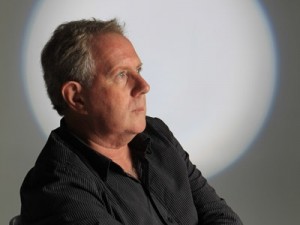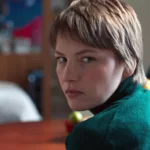Noel Mengel is best known in Brisbane circles as chief music scribe for the Courier Mail. Noel has a long lineage playing in bands, something he enjoys to this day. On a recent sabbatical he decided to have a crack at writing a novel. The result is RPM, a volume that has already won him the Premier’s Literary Award and a publishing deal with UQP. A coming of age story set in a Queensland country town, Mengel writes beautifully about what he knows best, music. Here he chats to TOM about his debut, RPM.
TOM: Why did you decide to write a novel? When did the idea for RPM first come to you?
Noel Mengel: I had always done some creative writing of short stories, especially in my 20s. When I was at university one of my lecturers liked my short story writing, so I filed that in the back of my brain somewhere. I have always written songs and jotted ideas for that part of my creative life in a journal. Then, like a lot of people, I became busy raising a family. As my sons grew and started to leave school I had a little more free time. One night, for perhaps the first time in 25 years, I found myself at home by myself on a Friday night. I picked up my journal and to my surprise started writing a story. An hour later I was still writing and when I looked at it I realised I had a solid plot and structure for something that would make a novel.
TOM: Did the discipline of newspapers prepare you for the novelist experience?
NM: Working in newspapers and magazines does make you good with deadlines. That’s naturally part of my personality anyway. Writing long feature stories must have helped with structure. But journalism and creative writing are completely different things. It’s a joy to let your imagination roam and create a world, and then to share that with people. I guess I was just hungry, and ready, to try something else and to revive my creative life. I’m sure I’m a much better debut novelist than I would have been in my 20s.
TOM: Are books about bands always more interesting before the band becomes famous?
NM: That’s the part I always love in music biographies. Everyone’s story is different in those formative years. When the band makes it, these days the story becomes much the same. That’s what attracted me to this story, writing about a time when no one knows how life will turn out but the characters are ready for something to happen.
TOM: How much autobiography is in there?
NM: Some. I grew up in a country town, Kingaroy. I played in a covers band when I left school and I worked there for a few years before I went to university. So the geography, the smells, the seasons, and of course a town with a large set of silos in the middle were familiar. But the rest is a work of the imagination, I didn’t have any conflicts in my bands, covers or otherwise, I had a great time. I enjoyed playing in cover bands and I enjoyed growing up in a country town. The town in the story could be any country town, and so many people have that experience and readers tell me they love the detail in the story about that. I thought it might be a book for music obsessives like myself and the characters in the book. But many people who aren’t, tell me they enjoy it too, they like hearing about a world they don’t know much about.
TOM: How important was your turntable during the writing of the book?
NM: My turntable is important in my life, full stop. It does rank behind my family, my guitars and my vinyl collection. I can replace the turntable. I’m not sure if I can replace my copy of Nick Drake’s Pink Moon I bought in 1975, it’s worth a fortune. So music was important, it plays a central role in the book, almost like another character. And there was a lot of time spent flicking through my records, just like the kids at the party in the opening chapter, looking for inspiration.
TOM: How long did it take to write the book?
NM: When I had the idea for the book I knew I needed to take time off work to devote to it. So there was four months of jotting ideas and then a 13-week stretch devoted to the first draft. And another six months of polishing and editing later. It’s not unusual for authors to get a solid draft in a burst like that. There is only so long the idea stays fresh and alive in your head, I think.
TOM: What albums from the past are you currently re-discovering?
NM: Ronnie Lane’s solo work, after The Faces, his three beautiful and pastoral sounding albums with Ronnie Lane’s Slim Chance. My copy of Mott the Hoople’s Brain Capers that I bought in 1972 (it appears in the book). REM’s debut EP Chronic Town. Yes, I like to arrange the albums leaning against my wall so there is something that looks really cool sitting at the front. Today it’s The Jayhawks’ Tomorrow The Green Grass, a cover as fantastic as the music inside.
TOM: What’s next for Noel as novelist?
NM: I have ideas for what seems like about 10 novels currently whirring in my head. One of these days one of them will spill out. For now I’m enjoying the feedback from all the people who tell me they love my book. Shucks, I can get used to that kind of glow. If people get half the joy from it that I did in the writing, I will be very content.
Noel Mengel’s RPM is out now through UQP.
ENDS




